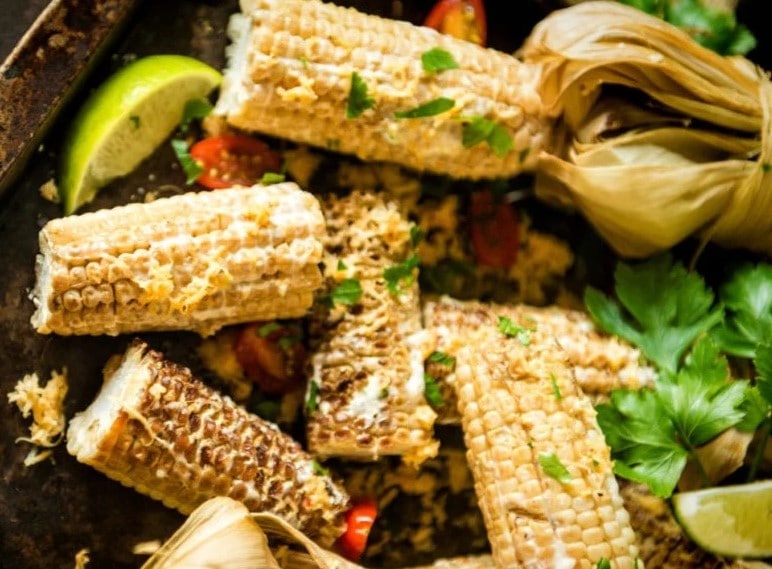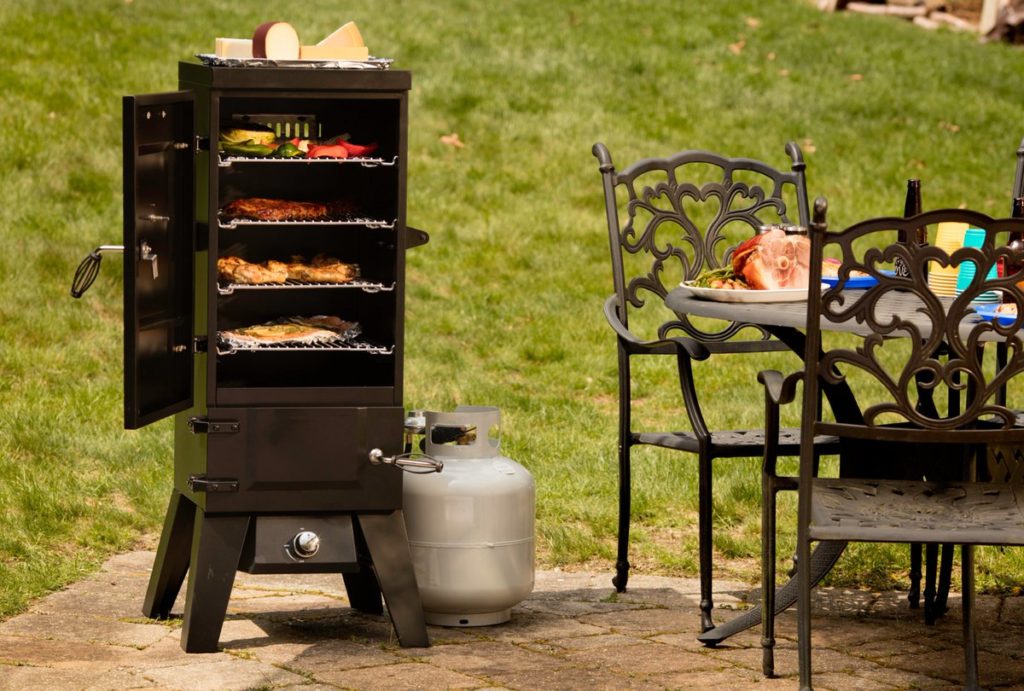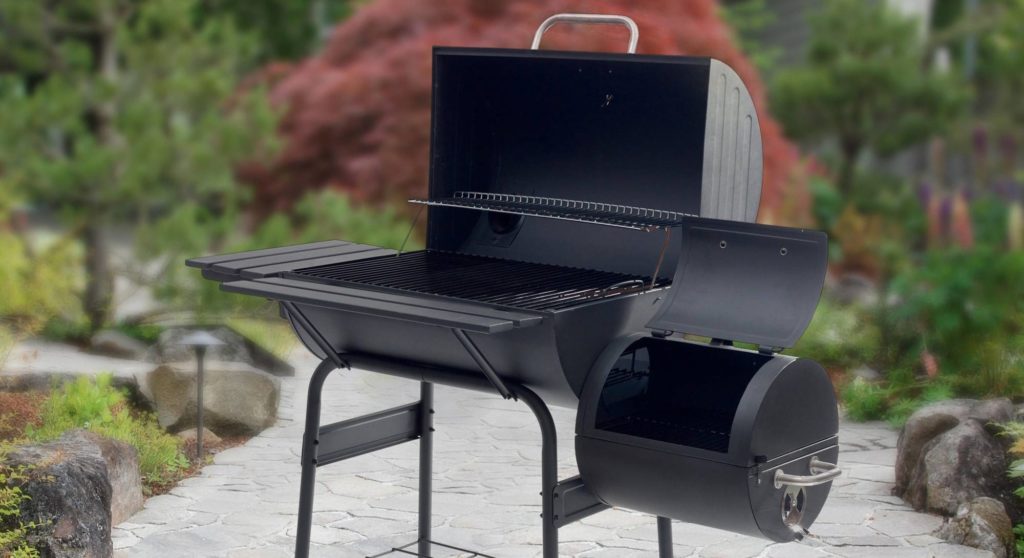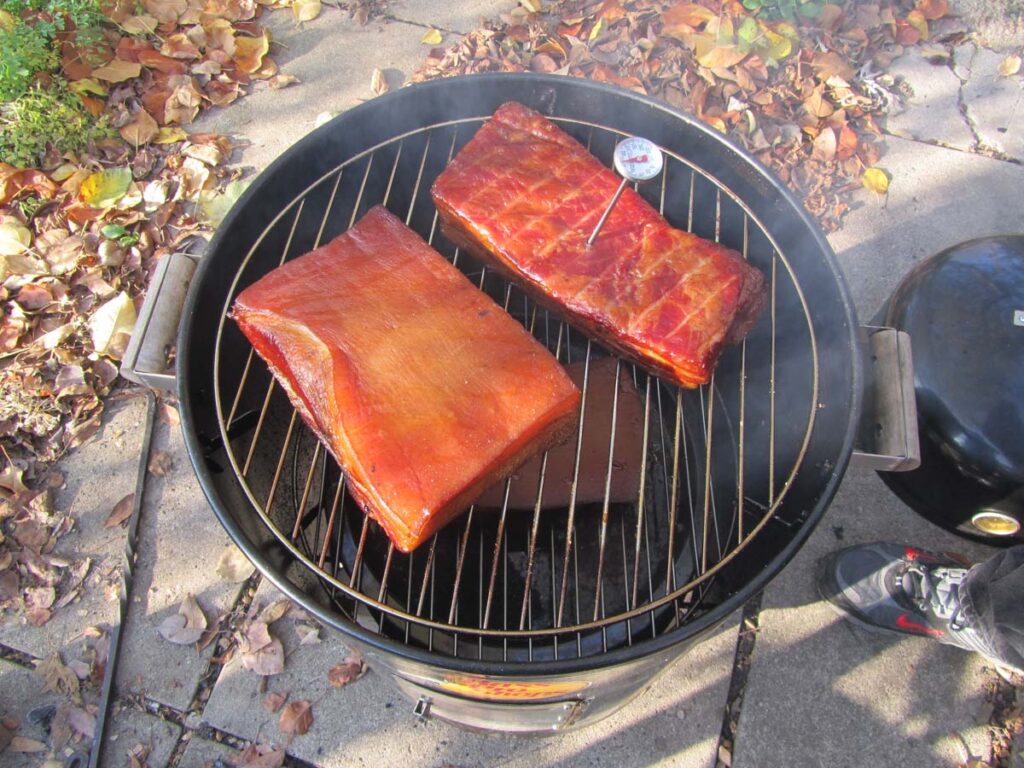
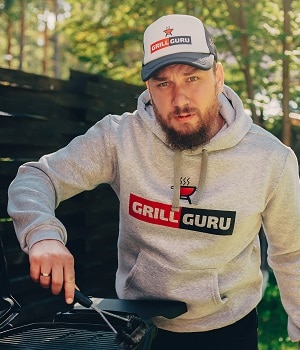
Brisket is actually anything but a “noble piece” of meat. A brisket, however, is one of the most stressed muscles in the animal, especially that of a cow. It has little intramuscular fat, but thick, sebum-like fat strands that connect the muscles with one another. Normally, it would never occur to you in your life that you could make a tender roast out of this piece. The beef brisket is usually used as soup meat, for corned beef, or for curing pastrami among others. And yet you can turn it into a tender, juicy, and extremely tasty beef brisket if you pay attention to a few things about smoking brisket.
However, to prepare a good smoked brisket, you must first know how to choose a good piece of meat. In no other BBQ discipline is it so crucial to have a high-quality starting product as with smoking brisket. With this guide, we want to show you how to make a good brisket.
Below are lists of things you’ll need to have at hand before starting:
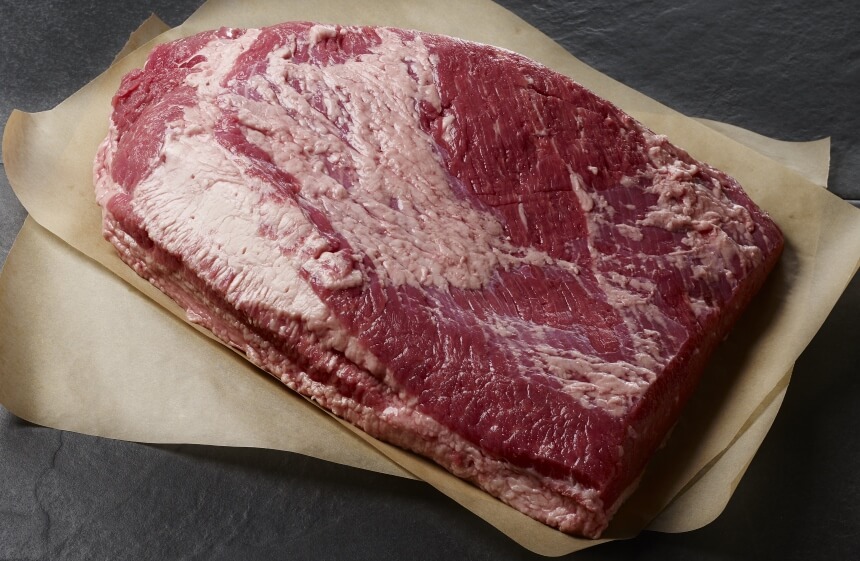
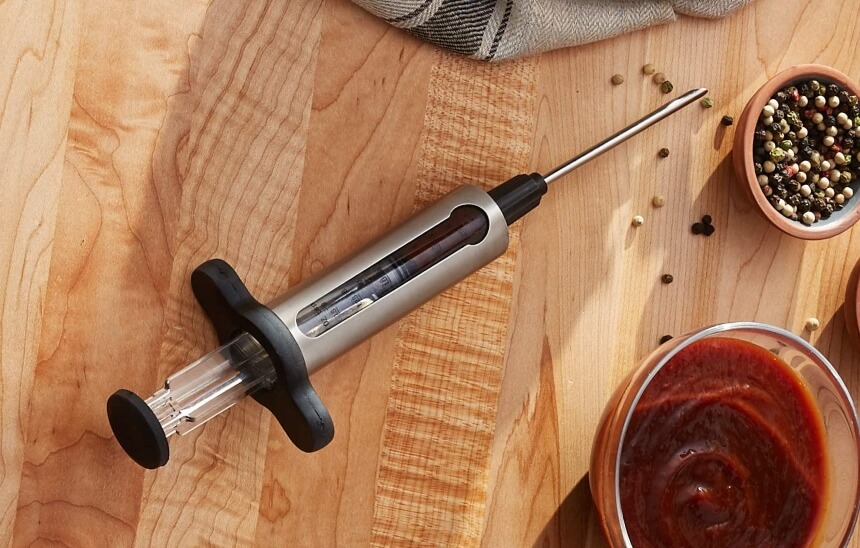
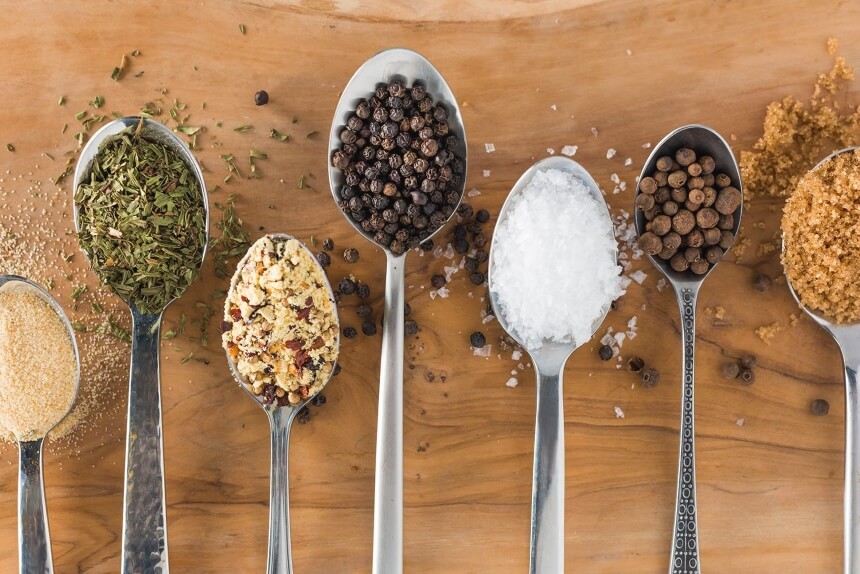
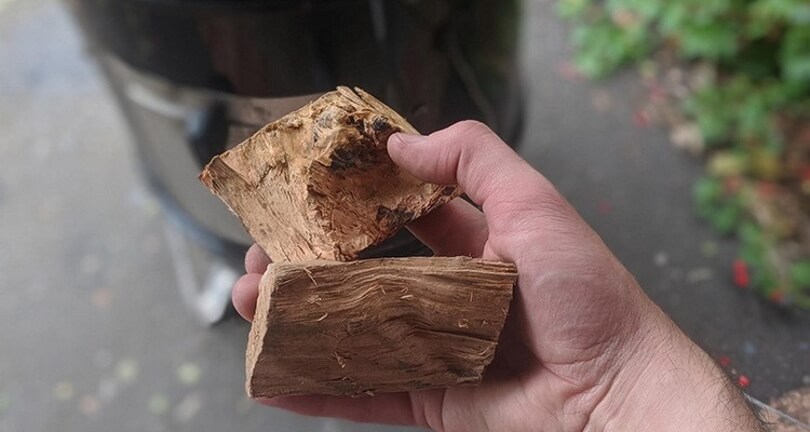
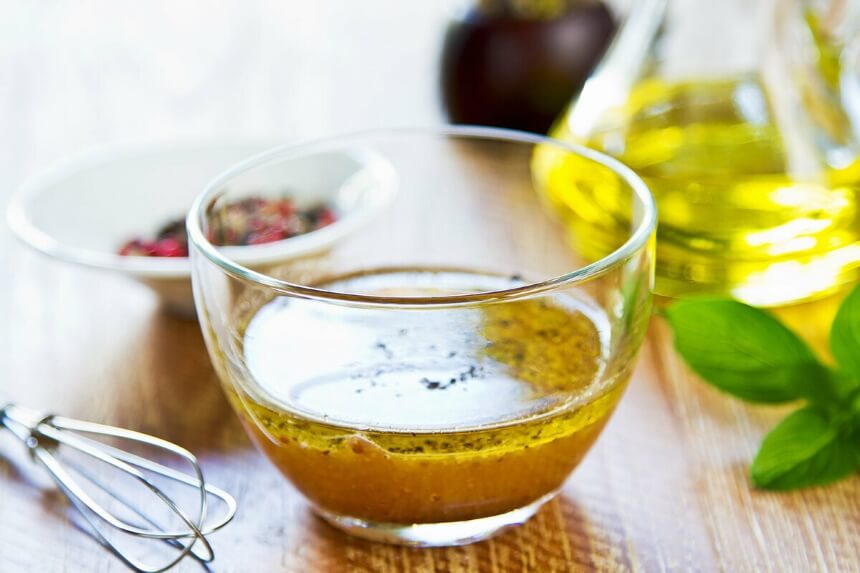
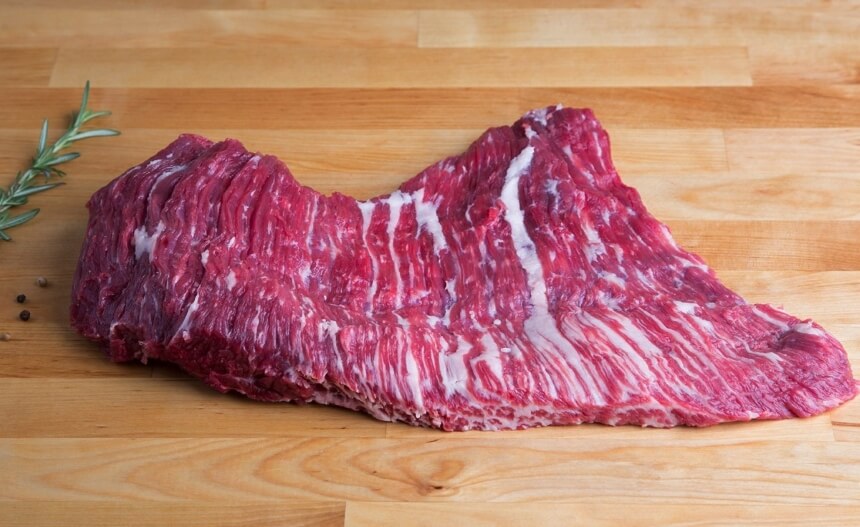
However, with the brisket, you should make sure that you get the highest possible quality starting product that also has the highest possible intramuscular fat content.
Unfortunately, it is not always easy to find the right cut. The normal butcher doesn’t know the typical cut for brisket. The beef brisket is used more as cooked meat and soup meat.
If possible, beef brisket for smoking should be a so-called “full packer brisket”. So, it’s a complete brisket, consisting of “Flat” and “Point”. The flat is the rather flat and lean piece, the point is on the flat. It’s thicker and more marbled. The two muscles are separated by a layer of fat. You can also easily recognize the two muscles by the different fiber orientations. The flat is later cut into thin slices, the so-called “burnt ends” are made from the point.
In the rest of this article, we would like to give you some tips on how to successfully prepare and cook a beef brisket low and slow.
When you have finally got a suitable piece of brisket, you can start preparing. If you then also have a full packer, i.e., a complete brisket in front of you, when you first look at it you probably think to yourself: “Now what?”
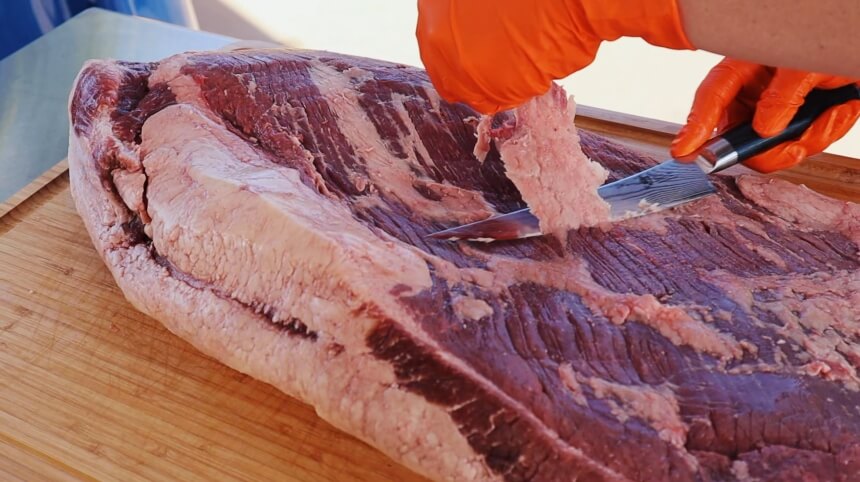
If you turn the brisket over, you can see the flat with fine marbling. This is exactly what a beef brisket should look like for beef brisket. At the bottom is the “fat cap” that separates the point from the flat.
First, you remove the fat from the beef brisket. In contrast to pork fat, which melts and keeps the meat juicy, beef fat does not melt. It becomes soft, but it remains almost completely intact. You can remove most of the fat and only leave a thin layer of fat on the underside of the brisket, which protects the brisket from the heat. The connection between point and flat consists of a thick sebum-like layer of fat. Most of this fat should also be removed as it prevents the beef brisket from crusting. Wherever fat remains, no crust can form. You can also separate Point and Flat directly and smoke individually. The flat (above) should be exposed and connected to the point with a thin layer of fat.
Cut the point straight off on the flat so that later you will get evenly sized slices when cutting open. The sections of the beef brisket should never be thrown away. Freshly minced, the meat is the ideal starting material for juicy burgers!
When it comes to seasoning, the following applies: what tastes good is allowed. However, beef brisket is usually seasoned differently than a pulled pork.
The aim is to intensify the inherent taste of the beef brisket. While paprika-heavy rubs such as Magic Dust are often used for pork, a beef brisket requires significantly fewer ingredients in a rub.
A classic smoking brisket rub from Texas, for example, is the Dalmation Rub, which consists exclusively of salt and pepper. 50% sea salt and 50% black pepper – that’s it!
A rub that everyone can make themselves at home because salt and pepper are always in the house. Amazing, isn’t it? So simple and yet so good.
All you need to season a good steak is salt and a little pepper. You don’t need more for a good brisket.
But in the long run, it’s a bit boring. You can bring an extensive taste profile to the meat with several ingredients in the rub. If you take the Dalmation Rub as a starting point, you can create complex beef rubs by adding garlic, onion, mustard flour, sugar, and chili, for example. Just try it. A rub doesn’t have to be a science. Just mix your favorites.
Our basic recipe for a standard beef brisket rub has the following ingredients:
If you don’t want to mix them yourself, you can of course also use ready-made mixes.
However, a rub only spices the meat on the outside. First and foremost, it ensures a spicy crust. If you want to season the meat from the inside, you need a marinade injector.
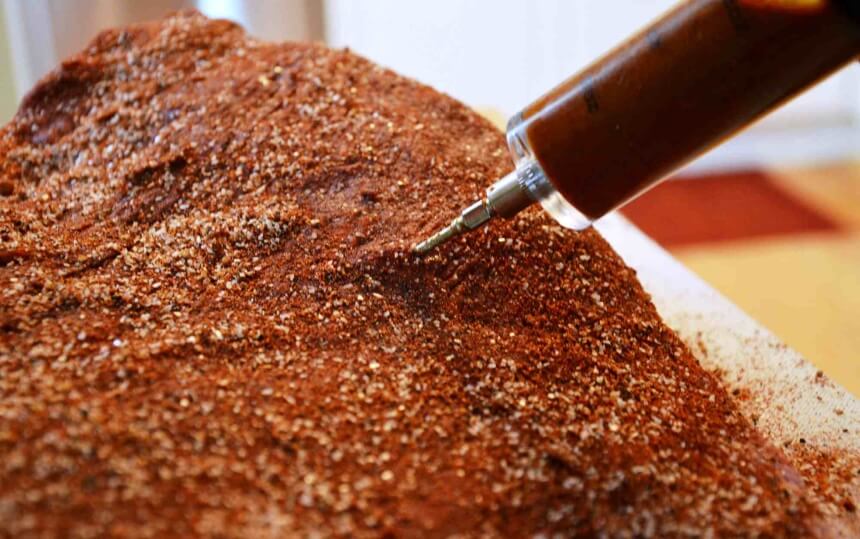
A beef brisket usually has very little intramuscular fat and it tends to become dry, for example, a pulled pork. The injection not only provides flavor from the inside but primarily also ensures a juicier beef brisket.
Very good results can be achieved with beef broth, for example. With the beef brisket injection, we want to support the meat’s taste. There is nothing better than a cola injection. You can use either pure or 50% beef brisket and 50% cola. Or how about some melted butter additionally? There are also numerous possible variations here.
Note that you have to first make the injection, then the rub! If you want to season the brisket and also decide to inject it, you should first inject the meat and then season it with the rub.
The injection never stays completely in the meat. If you pull the marinade syringe out of the meat, some of the injection liquid will always run out. When the brisket is seasoned, the escaping liquid would wash the rub off the meat.
Therefore, always inject first and then season with the rub! The injection makes the meat moister on the outside and the rub holds better.
Tip: Always put the beef brisket in a stainless-steel roasting pan, otherwise the kitchen can get messed up when it is injected.
When the meat is seasoned, let it sit for 30–60 minutes before putting it on the grill. If you want, you can also vacuum seal the brisket and store it in the refrigerator overnight. It doesn’t make a big difference, however.
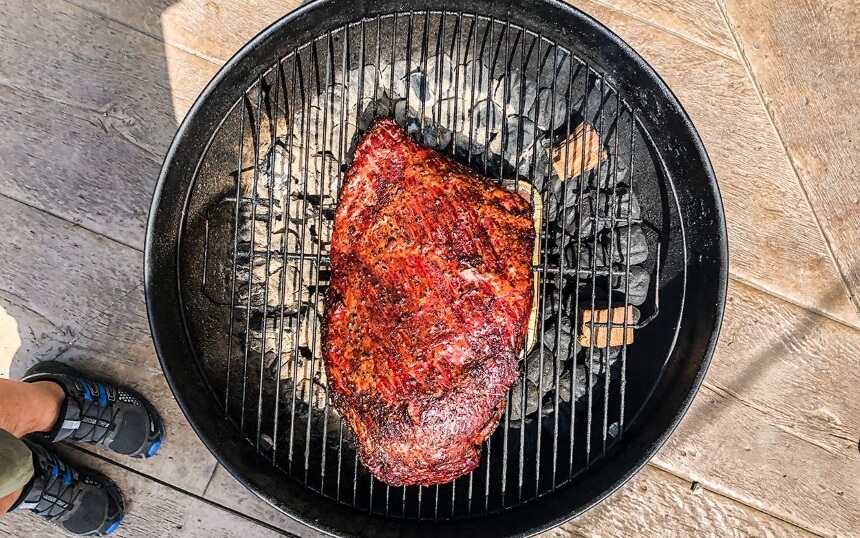
If you have decided to smoke with a pellet smoker, we recommend using oak wood. According to most reviews we’ve seen, the DIAMOND KING SMOKER INC 5LB Post Oak is the best for getting the right amount of smoke. It adds plum flavor and is great for cured smoking.
However, we will be showing you how to smoke brisket on a charcoal smoker grill.
When preparing on the kettle smoker grill, we recommend the minion method. With this, you can keep the kettle grill at low temperatures between 110–130 degrees for up to 20 hours.
A drip tray filled with water is placed on the charcoal grate – in the middle under the meat. Fill in boiling water straight away so that the grill doesn’t have to heat the water first. The water in the drip tray ensures a moist atmosphere in the kettle grill so that the meat does not dry out. In addition, dripping fat and meat juices are caught and the grill stays clean.
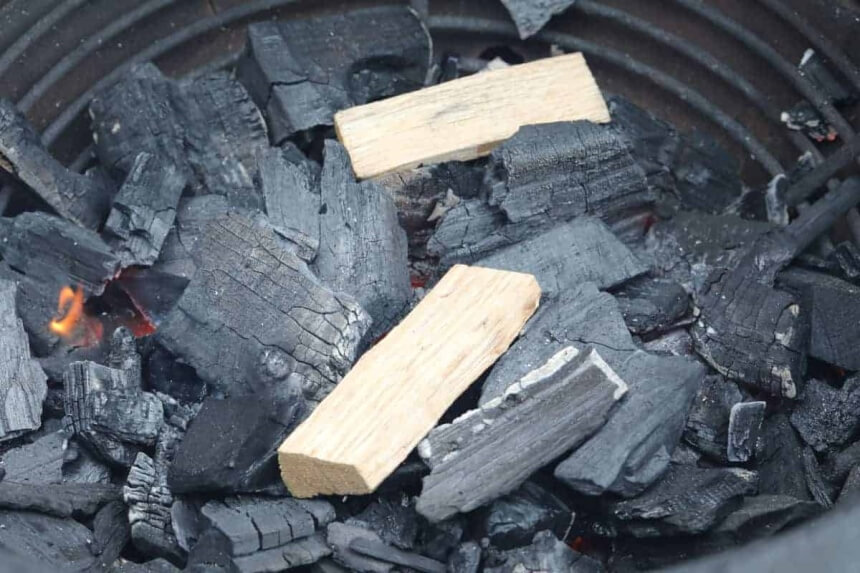
Do you prefer the flavor from applewood chips? Chosen by thousands of BBQ connoisseurs, the most recommended apple wood chip product for smoking brisket is the Western Premium Apple BBQ Cooking Chunks. We love this as the chips are 100% natural and ideal for smoking in charcoal, gas, or electric grill.
We recommend unwatered hickory chunks. Chunks are bigger than chips and don’t burn on the embers as quickly. Please do not water the wood, because we want to smoke with the wood aroma and not smoke with steam. Using an electric smoker, you can add wood chips to the chip tray.
The smoking wood is placed along the minion ring so that it gradually fades away and gives off a smoky aroma. One should be careful with the dosage of the smoking wood because it is like a “spice”.
You can also over-spice it over and the brisket will end up being too smoky or have a bitter taste. 3–4 chunks along the minion ring are usually sufficient. But of course, it also depends on the types of wood used, or the desired smoky taste, which you have to feel your way around over time.
As soon as the grill has been set to around 248 degrees Fahrenheit and runs constantly and stably for 45–60 minutes, the meat and the smoking wood are placed on the grill.
To monitor the core temperature of the beef brisket and the core temperature in the grill, a thermometer with two sensors is recommended. One sensor is placed in the middle of the meat, the other sensor is attached to the grate near the brisket with the clip supplied, but never directly above the embers! So, you can monitor the core temperature of the meat and the temperature in the grill.
Do not rely on the lid thermometer of the kettle grill, because the deviations from the temperature on the grill can be up to 86 degrees Fahrenheit.
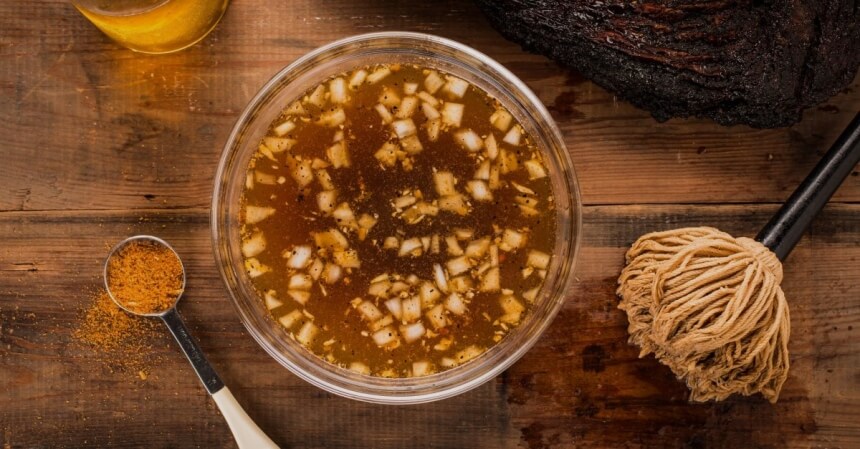
When mopping, do it carefully, as there is a risk that mopping will remove the rub from the meat. However, you shouldn’t mop too often, as this will increase the cooking time. The mop cools the meat, and the cooking time is extended by 15–20 minutes. You should mop a brisket a maximum of 2–3 times.
An example of a beef brisket mop sauce would be the following recipe:
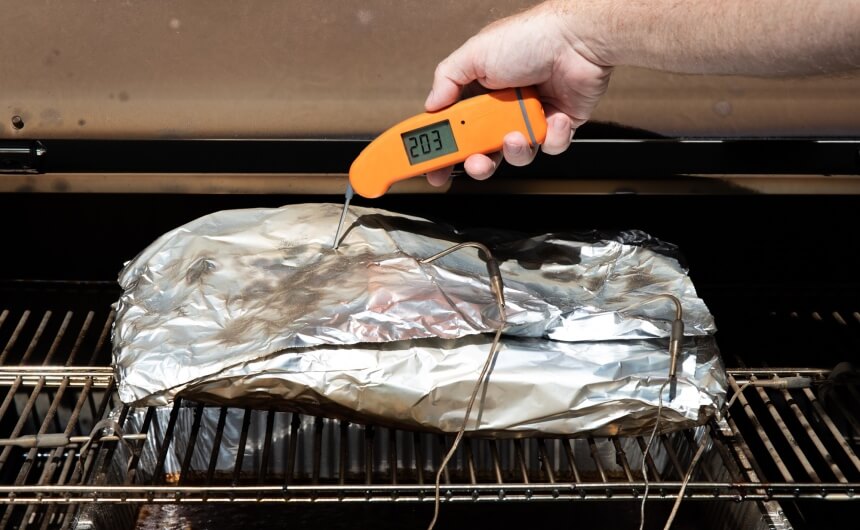
But very few pieces have neither the size nor the fine marbling. At the butcher, you usually only get smaller pieces with a weight of 4 to 7 pounds. If you grill these pieces low and slow for 15 hours, there is a risk that they will dry out faster before they become tender.
Therefore, we recommend wrapping the beef brisket in aluminum foil from a core temperature of around 158 degrees. The film must be closed tightly and airtight. In addition, it is advisable to put some liquid (e.g. 50 ml beef stock) in the foil and also to put a few flakes of butter on the brisket. Butter always helps!
The total cooking time is usually only 8–10 hours, depending on the size and weight of the starting meat. The brisket usually takes 5–6 hours to reach 158 degrees. It then needs another 2–3 hours in the foil until it is tender and has a core temperature of around 194 degrees.
Usually, the brisket is ready at a core temperature between 190–197 degrees. You shouldn’t cook a beef brisket according to the core temperature but rather according to tenderness.
For example, it can also happen that the beef brisket is ready at 185 degrees or only at 203 degrees core temperature. The brisket is ready when the meat gets crumbly, begins to dry out, and you can remove the thermometer without resistance.
You can smoke the brisket as a whole, or you can separate the point from the flat before it goes on the grill. If you grill the brisket in one piece, the flat will probably be ready sooner. You can then remove the point from the flat and put it back on the grill until it becomes tender. When it’s done, the point is cut into cubes about 0.8 x 0.8 inches. Often the burnt ends are then seasoned again with rub and glazed with a BBQ sauce of your choice and then “baked” in a bowl on the grill. Burnt ends are particularly flavorful pieces that are cut from the point. Due to the higher fat content in the point, the point usually takes longer to become tender.
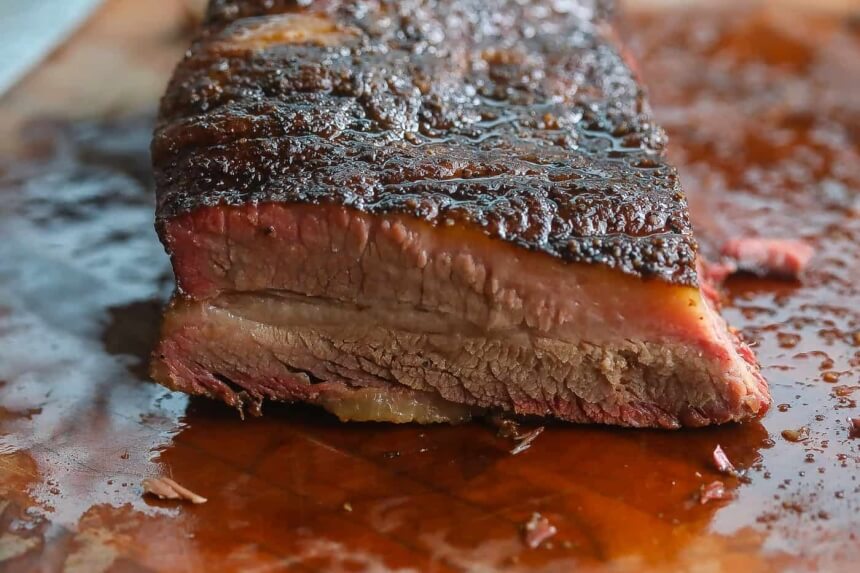
When the meat relaxes, it becomes even more tender. It also absorbs some liquid again, making it juicier. When you open the foil and remove the brisket for the cut, you should collect the leaked liquid in a bowl.
This liquid can be used as a sauce for the beef brisket. Pure or mixed with BBQ sauce, the result is a tasty sauce. Simply dip the brisket slices in the sauce and you have a great taste experience.
Beef brisket is a large piece of meat and you don’t eat a beef brisket completely every time. Sliced thinly, leftovers are wonderfully suitable as a bread or sandwich topping. Or how about a beef brisket burger? Leftovers can also be frozen wonderfully.
A brisket chili from the Dutch oven with diced beef brisket is also a dream. The possibilities to recycle leftover pieces are almost unlimited.
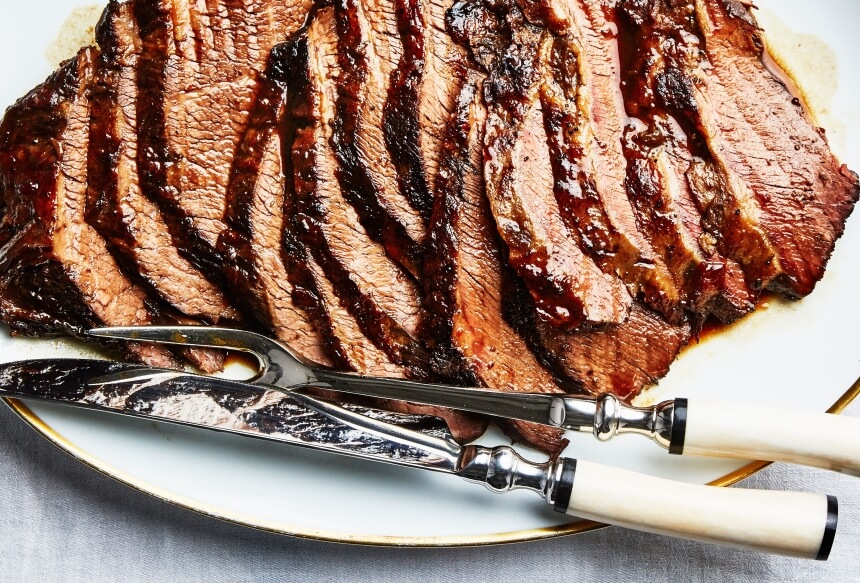
Preparation time: 10 minutes
Working hours: 11 minutes
Main ingredient
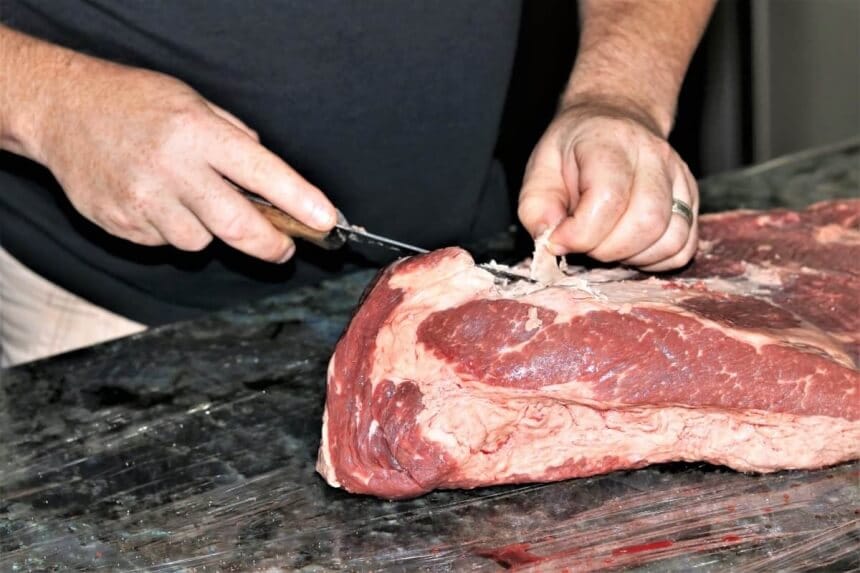
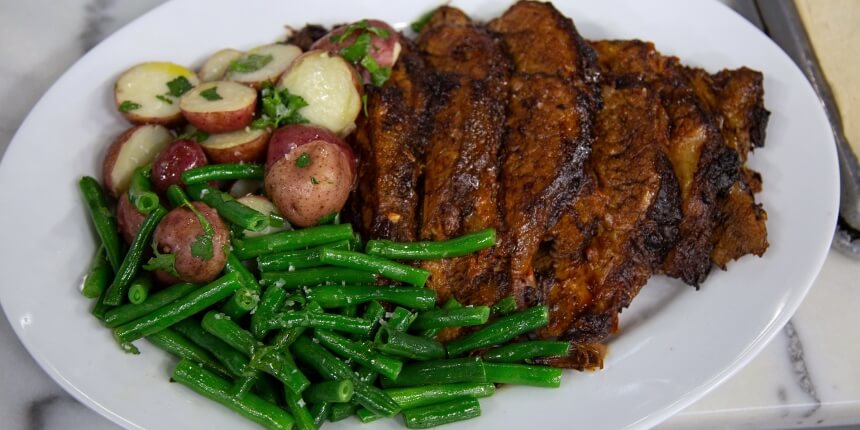
You can also serve the following side dishes with smoked brisket.
Smoked brisket is part of the supreme barbecue discipline. The brisket is usually prepared at low temperatures between 100 and 130 degrees Celsius in the hot smoke of a smoker or kettle grill. The meat is rubbed in advance with a dry mixture of spices (BBQ rub) and then cooked in the smoke for between 10-18 hours (depending on the thickness and method of preparation). When the brisket has been cooked to the target core temperature (approx. 190–197 degrees Fahrenheit), it is cut into thin slices across the grain and served.
This is our take on smoking brisket cut from beef. There are certainly many ways that lead to the perfect brisket. If you do it according to these instructions, it won’t be that bad. In any case, the perfect beef brisket has to be juicy and tender!
